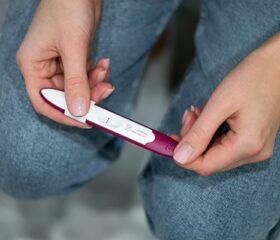Pregnancy Fatigue: What Causes It and How to Cope
Did someone forget to tell you about the absolute exhaustion that comes along with growing a tiny human inside your body?

If your pregnancy has you feeling like climbing a flight of stairs is an award-worthy endeavor, you aren’t alone. Pregnancy fatigue is as real as it gets and is one of the most common complaints from expectant mothers.
We’ll give you the lowdown on what’s going on with your energy levels and a few practical tips to help you feel a little less fried.
Is fatigue normal during pregnancy?
Sadly, yes, bone-level fatigue is a hallmark of pregnancy, especially during your first and third trimesters. In fact, self-reported data from pregnancy tracker apps suggests that about 98% of women experience pregnancy fatigue. 1
What does pregnancy fatigue feel like?
You’ve undoubtedly found it hard to get out of bed for work before, but pregnancy fatigue is another story. It might feel a little like the fatigue you get when you’re sick (without most of the accompanying symptoms, although nausea is also a common early-pregnancy symptom).
You may feel like you want to sleep much more than usual, and you might even feel exhausted doing something as simple as putting on your socks.
What causes fatigue during the first trimester of pregnancy?
As mentioned, fatigue is very common during the first trimester. At this stage, several culprits could be responsible. One of the most likely causes for that lack of energy is hormonal changes.
Of all the hormones in your pregnancy cocktail, surging progesterone is the most likely to have a noticeable sedative effect. Think of it as a necessary trade-off for supporting your baby and preparing your body for breastfeeding.
Here are some of the other factors that can cause unusual tiredness during the first trimester: 2
- Placenta construction: Your body’s working overtime to build the placenta, the organ that will become your baby’s lifeline for nutrients and oxygen. This is an energy-sapping project.
- Blood volume boost: With all of this new development, your body needs to pump more blood for nourishment. Expect your heart to work harder to meet the demand.
- Physical changes: Your metabolism will speed up along with your heart rate, and your blood sugar and blood pressure levels will decrease. Fatigue is a natural byproduct of these changes.
Moreover, some of the other less glamorous pregnancy symptoms, like morning sickness (nausea) or pregnancy insomnia, may only exacerbate your tiredness.
Can pregnancy fatigue hurt your baby?
While pregnancy fatigue is uncomfortable, it won’t harm your baby at all.
That being said, extreme cases of fatigue warrant a trip to the doctor, especially if your tiredness is accompanied by other concerning symptoms (more on this below).
Ovulation can also cause fatigue
Many women experience ovulation fatigue when they ovulate (when their body releases a mature egg to be fertilized by sperm). Since fatigue is a very early pregnancy symptom, it’s possible to mistake it for ovulation fatigue. If you haven’t confirmed whether you’re pregnant yet, do so by taking a pregnancy test.
What causes fatigue in the second and third trimesters?
The good news is that pregnancy fatigue usually declines in the second trimester. The not-so-good news is that not all women see their fatigue ease up around this time, and about 60% of expecting moms see that extreme tiredness come back in the third trimester. 3
If that happens to you, your hormones won’t necessarily be the culprit. All the extra weight you’ll carry in the third trimester will take a toll on your body. Add in pregnancy symptoms like sleep deprivation, discomfort, heartburn, and lower back pain, along with your baby’s kicks and tumbles, and you’ve got a recipe for fatigue.
Moreover, planning for your baby’s arrival, juggling it with your work, and finishing all those last errands on your to-do list may leave you exhausted. 3
How to naturally boost your energy levels
There’s no magic bullet to eliminate pregnancy fatigue, but there are tactics you can use to manage your energy levels and feel more like yourself. 4
Rest and relax
While it might seem like the obvious solution, now, more than ever, it’s important to listen to your body when it tells you to sit (or lie) down.
Short power naps (20–30 minutes) can be game-changers. Avoid long or late-day snoozing that can throw off nighttime sleep, and try for an extra hour each night. Ask for help with chores or hour adjustments at work.
Eat well and stay hydrated
Dehydration worsens fatigue, so keep a big water bottle on hand and sip throughout the day (set a daily goal of 64 ounces, or 8 cups).
As for your pregnancy diet, eat frequent, small meals to steady your blood sugar and prevent energy crashes. Focus on nutritious foods (e.g., whole grains, lean protein, fruits, and vegetables) and cut back on processed foods, sugar, and caffeine. 5
Stay active
Get your body moving with regular, moderate-intensity exercise. Making time for a quick walk or prenatal yoga will do wonders for raising your energy levels and sleep quality. Your goal should be 150 minutes or more per week.
Outside of this, make sure you stretch regularly to improve your circulation and fight stiffness, especially if you’re a desk jockey at work. 6
When to see your doctor about pregnancy fatigue
Pregnancy fatigue is normal, but extreme cases need special attention. If you’re experiencing tiredness that won’t go away no matter how much you rest, it’s time to get checked out.
You should also be quick to see your doctor if symptoms like bleeding, dizziness, fainting, shortness of breath, heart palpitations, sadness, or thoughts of self-harm accompany your fatigue.
Conditions that extreme tiredness could indicate
If any of the symptoms above sound painfully familiar, your doctor will want to check for underlying medical conditions, one of the most notable being anemia. Anemia often comes about from an iron deficiency, which is all too common during pregnancy.
Particularly past week 20 of your pregnancy, you’ll see a dramatic expansion in blood volume that’ll lower your red blood cell count. 7 The result is a depletion in your iron stores that will leave you extremely weak—maybe even pale, breathless, or dizzy. 8
Other conditions your doctor will want to rule out include:
- Thyroid issues: Hypothyroidism (underactive thyroid) or hyperthyroidism (overactive thyroid) can show up and steal your vitality. Partner symptoms include sudden weight fluctuations, a prickly temperament, and sadness. 9
- Gestational diabetes: Lingering fatigue, nausea, and blurry vision during pregnancy can all point to this condition if your body turns insulin-resistant and struggles to wrangle all that extra pregnancy blood sugar. Your doctor can spot this at your glucose screening (when you’re between 24 weeks and 28 weeks pregnant). 10
- Prenatal depression: Occasionally feeling sad is one thing, but compounding this sentiment with other symptoms is a different story altogether (e.g., extreme sadness, loss of appetite, not wanting to leave the bed). If you’re struggling with your emotions for more than a couple of weeks, chat with your doctor ASAP for advice or treatment options. 11
- Chronic fatigue syndrome: This is a rare, complex condition that isn’t limited to childbearing. However, women who carry this condition into pregnancy gamble with worse debilitating effects due to their unique hormonal changes. 12 13
Don’t let that list of possible conditions alarm you—just see your doctor if you think your fatigue might be abnormal. Whatever the cause is, they’ll help you figure it out and treat it.
Final thoughts
Kudos for making it to the end of the article without falling asleep! While fatigue during pregnancy is exhausting in and of itself, put some time aside to get the rest that you need, and again, don’t be shy about reaching out to our doctor if you’re at all concerned.
Article Sources
- npj Digital Medicine. "Prevalence and course of pregnancy symptoms using self-reported pregnancy app symptom tracker data" Retrieved July 10, 2025.
- Johns Hopkins Medicine. "First Trimester Fatigue" Retrieved July 10, 2025.
- International Forum for Wellbeing in Pregnancy. "Tiredness and Fatigue during Pregnancy" Retrieved July 10, 2025.
- Main Line Health. "4 ways to combat pregnancy fatigue" Retrieved July 10, 2025.
- BayCare. "Foods to Keep Your Energy Up During Pregnancy" Retrieved July 10, 2025.
- U.S. Centers for Disease Control and Prevention. "Physical Activity Recommendations for Pregnant and Postpartum Women" Retrieved July 10, 2025.
- The Continuous Textbook of Women’s Medicine. "Maternal medical health and disorders in pregnancy" Retrieved July 10, 2025.
- American Society of Hematology. "Anemia and Pregnancy" Retrieved July 10, 2025.
- March of Dimes. "Thyroid conditions during pregnancy" Retrieved July 10, 2025.
- Yale Medicine. "Gestational Diabetes: Symptoms, Causes, and Treatments" Retrieved July 10, 2025.
- American College of Obstetricians and Gynecologists. "Depression During Pregnancy" Retrieved July 10, 2025.
- New Jersey Chronic Fatigue Syndrome Association, Inc. "Pregnancy in Women with Chronic Fatigue Syndrome (ME/CFS)" Retrieved July 10, 2025.
- HER Foundation. "About HG" Retrieved July 10, 2025.







